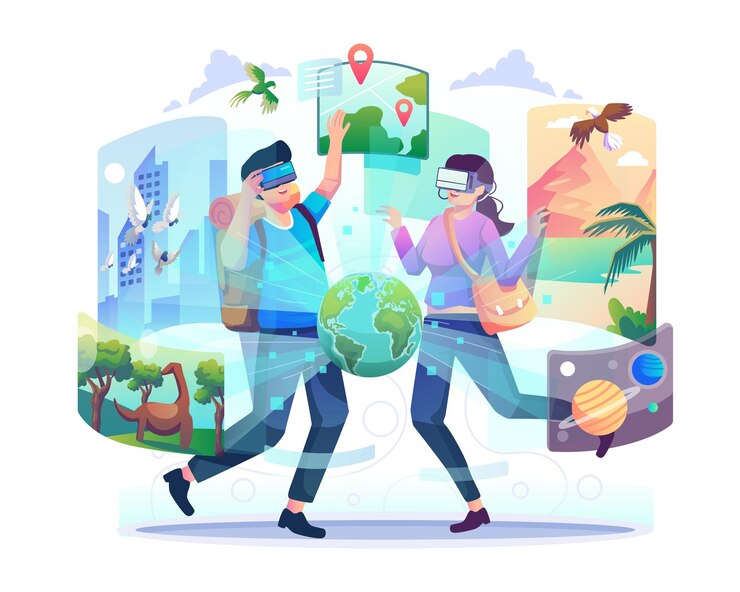Let's Discuss
Enquire NowThe incredibly complicated and detailed computer system more commonly known as Virtual Reality is where virtual tourism first emerged. An area of space that actually exists, in reality, is represented by a computer-generated graphic image known as Virtual Reality. Prior to being modified by the airline industries for the instruction of commercial pilots, such representations were first employed for military training purposes. Later, the concept was incorporated into video games, medical operations, and more recently, the travel sector. In addition to a computer screen, spaces can be turned into virtual realities.
Let us comprehend what Virtual Reality Tourism is in order to understand what it is all about.
A virtual world, or more precisely, a computer-based simulated environment, is a place and time notion that is intended to encourage interaction between users who communicate via avatars. An idea for a virtual reality tour is one that is built on three-dimensional graphic representations, aural stimulants, and tactile stimulants. In the world of virtual tourism, we can travel to any location and interact with and change the objects within the environment we are seeing in ways that are not realistically conceivable. A person can customize his environment and activities to suit his unique likes and dislikes via a virtual reality tour. With the exception of true gravity, geography, mobility, and occasionally delays in real-time actions, it will be very comparable to the real thing.
The use of an artificial, computer-based reality makes all of the aforementioned behaviours conceivable. One needs stereoscopic eyewear, which will offer 3-D pictures, as well as a tracking device to keep track of actions, in order to experience virtual reality while on the trip. Data gloves or the actual goggles themselves are the most common types of tracking equipment.

Mankind will no longer have to put up with the numerous time-consuming security procedures and pre-departure horrors familiar to regular tourists and travellers while using VR technology to travel. However, there are a lot of worries about the growth of VR – based tourism businesses. This is because virtual reality tourism often eats into the revenue and job opportunities provided by traditional tourism. The traveller doesn’t need to purchase stuff such as plane tickets, hotel rooms, public transit, and other things typically associated with travelling and going on tour since he has never actually left his current location and can choose to start, resume, and end his “travel” experience whenever he feels like it because VR doesn’t really exist in actual time and space.
Virtual tourism may be the most ideal kind of travel ever created when all is said and done. However, it also brings up some brand-new issues in relation to the security of use and travel in “virtual worlds/nations”. Many people are concerned about the potential mental effects of this activity’s technological components on their health. The user frequently loses the ability to distinguish between reality and a virtual world since such excursions need the use of specialised computer equipment, such as Vr glasses and touch-sensitive gloves. Despite the fact that virtual tourism enables the user to securely partake in things he ordinarily wouldn’t do on a trip because of health concerns, one can engage in these activities without experiencing any negative consequences. Or at least that is what the majority of people think. After all, if an individual is actually performing the action or just participating in it digitally is completely unrelated to what their brain observes and how the body feels.
Do you believe VR tourism will become popular? Does it possess the potential to change how people travel and enjoy their holidays in the future?
VR tourism has the ability to alter how we now see travel. It might also alleviate all the worries and apprehensions about security that seem to dissuade people from travelling these days. However, it will be a long time before these technologies are accessible to everyone. Hollywood is the only place where possibly accurate virtual tourist scenes may be portrayed until the technology is fully developed.
Conclusion
It is obvious that virtual reality tourism is gaining popularity, but it will remain mostly untapped for the foreseeable future. Do you have a project in mind that utilizes VR? Get in touch with us here to talk more on your ideas!
Disclaimer: The opinions expressed in this article are those of the author(s) and do not necessarily reflect the positions of Dexlock.



